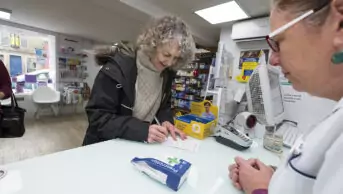
Shutterstock.com
A Welsh health board has seen an almost 40% reduction in the number of cases involving the ‘superbug’ Clostridium difficle after cuts to antibiotic prescribing.
A spokesperson from Betsi Cadwaladr University Health Board (UHB) confirmed to The Pharmaceutical Journal that its antibiotic prescription rate in primary care fell by 12.6% over the two years between April 2016 to March 2019.
They added that this resulted in a 38.7% decrease in the number of patients developing C. difficile infections in one year, from 271 in 2017/2018 to 166 in 2018/2019.
At 12.6%, the reduction in antibiotic prescribing — which the health board says saved £185,000 — is more than double the 5% target set by the Welsh government for 2018/2019.
Susan Murphy, assistant director of pharmacy and medicines management at Betsi Cadwaladr UHB, said that pharmacists and pharmacy technicians working in GP surgeries and community pharmacies have been pivotal to the success in reducing antibiotic prescribing.
Part of this success has been attributed to the health board launching a sore throat test-and-treat pilot in community pharmacies in December 2018, where pharmacists offer a point-of-care swab test to determine whether antibiotics are needed.
“We expect by Christmas [2019] to have over 100 community pharmacies offering a sore throat test and treat service,” Murphy told The Pharmaceutical Journal.
Less than 15% of patients who are tested “actually get a prescription for antibiotics”, Murphy explained, adding that she still expects the service to reduce prescribing rates within the health board further.
She added that pharmacists and pharmacy technicians working in GP practices with high prescribing rates, alongside microbiologists and clinical directors, have been vital to the overall reduction in antibiotic prescriptions.
There are now 107 GP practices across North Wales with regular access to a pharmacist or technician, Murphy revealed.
“Some will also work part time for us; they look at patient safety, quality [of prescribing] and prescribing spend. In our work plan, antibiotic prescribing is a priority over other work,” she said.
Some GP practices in the health board are also using point-of-care testing to look for high levels C-reactive protein, which usually indicates a bacterial infection, contributing further to the decline in antibiotic prescribing.
“It’s taken us quite a while to get there; it’s been about engagement with GPs and other prescribers, and about having one consistent message,” she said.
According to the latest official figures published by Public Health Wales, Betsi Cadwaladr UHB’s antibiotic prescribing rate has reduced the most our of all seven health boards in Wales.
The figures, which cover the prescribing rate change between 2016/2017 and 2017/2018 financial years, show that Betsi Cadwaladr UHB’s antibiotic prescribing rate fell by 5.9% over the one-year period. Abertawe Bro Morgannwg’s prescribing rate decreased by 1.1%; Aneurin Bevan UHB’s by 1.1%; Cardiff & Vale UHB’s by 1.1%; Hywel Dda UHB’s 1.8% and Powys Teaching Health Board by 1.9%.
However, Cwm Taf UHB’s antibiotic prescribing increased by 0.8% in the same 12 months.


